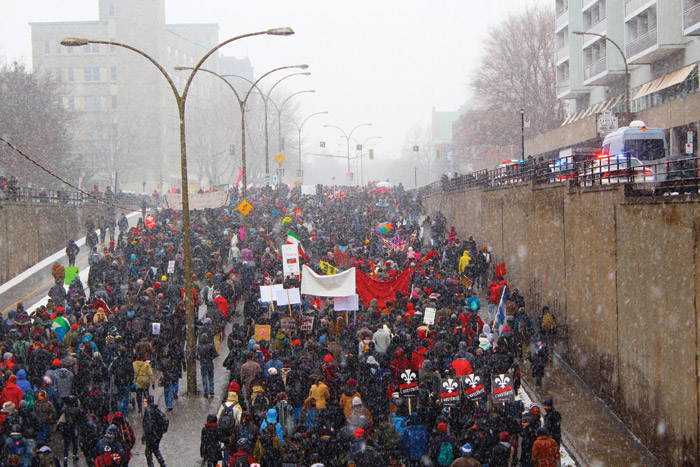A demonstration of approximately 6,000 people took to the streets on March 21 against Quebec provincial government austerity cuts.
The protest was organized by a group called Printemps 2015, and is scheduled to be the first of a series of weekly protests planned for the next few months, according to Brice Dansereau-Olivier, an organizer of the Printemps 2015.
“The series of demonstrations will take place every Saturday at 2 p.m., so that workers and families can attend as well,” Dansereau-Olivier said.
The protest was deemed illegal by the Montreal police from the onset, as organizers did not provide an itinerary for the march, although the demonstration was generally peaceful and was allowed to continue by the police. Protesters walked in cold, snowy conditions around the downtown area, starting from Square Emile-Gamelin near the Berri-UQÀM metro station.
According to Dansereau-Olivier, the provincial austerity measures would impact many people, including workers, students, and the unemployed. He pointed to the cuts in education and health care reforms of Bill 20, which propose to enforce an annual quota for patients all family practitioners must meet, as well as merge administrative structures for healthcare institutions.
“Experts agree that this is going to drastically reduce the number of services offered to the public,” he said. “On the education side, [we’ve seen] $300 million in cuts up to now, and we don’t expect following budgets to be any different. This has manifested itself on many campuses [in the form of] classes that are being cancelled completely, some programs are being reevaluated, the number of students per class has gone up, and teaching conditions are drastically affected.”
Agostino Minter, a Liberal Arts Concordia student who was present at the protest, explained that his faculty, as well as several other faculties at Concordia, had voted to go on a two-day strike. He elaborated on his opposition to austerity measures.
“The whole theoretical basis on austerity has very shaky footing,” he said. “These kind of measures actually [end] up being very negative to growth and ends up amounting to a public subsidy for private ventures. They’re financing Plan Nord while they’re cutting health care and education, which I think is just a bizarre gesture for our representatives to do.”
An anonymous protester holding a Printemps 2015 banner said that while he was uncertain of what the protests might be able to accomplish, he believed in their importance.
“I believe if you can get people together and talking about the problems, we’ll get closer to the solutions,” he said. “We’re as much talking to each other as we are talking to the general public, we’re reminding each other that we care; there are people who care [enough] to hit the streets on a cold, snowy day. We’re going out and giving our narrative to the public, who unfortunately only gets their narrative from sources that generally have the same interests as the government, the elite.”
Dansereau-Olivier expanded upon the importance of having the demonstrations be family-oriented, stating that this was to remove the public’s perception of the Printemps 2015 protests as similar to the 2012 student protests.
“2012 was specifically student-oriented, and that grew into a bigger movement because of repercussions the government brought down on the student movement,” he said. “But what we want this time is a social strike, getting all sectors of society to strike at the same time, to really have a pull on the government. We want families to be there to show […] it’s working families, it’s ordinary people that are struggling with the cuts the government is putting forward, that they won’t sit by idly while the government destroys all that makes Quebec different.”
According to Dansereau-Olivier, the goal of Printemps 2015 is to be a platform for communication and solidarity, in order to help groups achieve their goals.
“The committee focuses on fostering communication between student groups and local unions,” he said. “We’re going to keep doing that work, building bridges between institutions and other groups in hopes that we can get all the major groups on board for the [Printemps] movement.”







